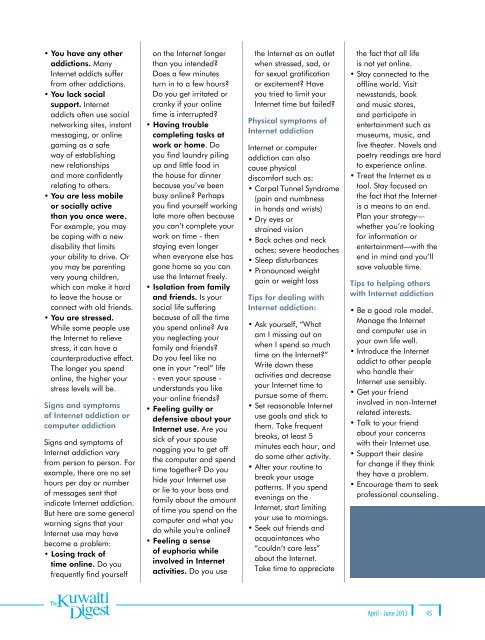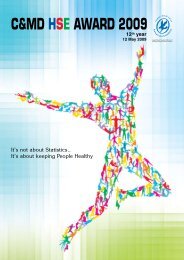6 - Kuwait Oil Company
6 - Kuwait Oil Company
6 - Kuwait Oil Company
You also want an ePaper? Increase the reach of your titles
YUMPU automatically turns print PDFs into web optimized ePapers that Google loves.
• You have any other<br />
addictions. Many<br />
Internet addicts suffer<br />
from other addictions.<br />
• You lack social<br />
support. Internet<br />
addicts often use social<br />
networking sites, instant<br />
messaging, or online<br />
gaming as a safe<br />
way of establishing<br />
new relationships<br />
and more confidently<br />
relating to others.<br />
• You are less mobile<br />
or socially active<br />
than you once were.<br />
For example, you may<br />
be coping with a new<br />
disability that limits<br />
your ability to drive. Or<br />
you may be parenting<br />
very young children,<br />
which can make it hard<br />
to leave the house or<br />
connect with old friends.<br />
• You are stressed.<br />
While some people use<br />
the Internet to relieve<br />
stress, it can have a<br />
counterproductive effect.<br />
The longer you spend<br />
online, the higher your<br />
stress levels will be.<br />
Signs and symptoms<br />
of Internet addiction or<br />
computer addiction<br />
Signs and symptoms of<br />
Internet addiction vary<br />
from person to person. For<br />
example, there are no set<br />
hours per day or number<br />
of messages sent that<br />
indicate Internet addiction.<br />
But here are some general<br />
warning signs that your<br />
Internet use may have<br />
become a problem:<br />
• Losing track of<br />
time online. Do you<br />
frequently find yourself<br />
on the Internet longer<br />
than you intended<br />
Does a few minutes<br />
turn in to a few hours<br />
Do you get irritated or<br />
cranky if your online<br />
time is interrupted<br />
• Having trouble<br />
completing tasks at<br />
work or home. Do<br />
you find laundry piling<br />
up and little food in<br />
the house for dinner<br />
because you’ve been<br />
busy online Perhaps<br />
you find yourself working<br />
late more often because<br />
you can’t complete your<br />
work on time - then<br />
staying even longer<br />
when everyone else has<br />
gone home so you can<br />
use the Internet freely.<br />
• Isolation from family<br />
and friends. Is your<br />
social life suffering<br />
because of all the time<br />
you spend online Are<br />
you neglecting your<br />
family and friends<br />
Do you feel like no<br />
one in your “real” life<br />
- even your spouse -<br />
understands you like<br />
your online friends<br />
• Feeling guilty or<br />
defensive about your<br />
Internet use. Are you<br />
sick of your spouse<br />
nagging you to get off<br />
the computer and spend<br />
time together Do you<br />
hide your Internet use<br />
or lie to your boss and<br />
family about the amount<br />
of time you spend on the<br />
computer and what you<br />
do while you're online<br />
• Feeling a sense<br />
of euphoria while<br />
involved in Internet<br />
activities. Do you use<br />
the Internet as an outlet<br />
when stressed, sad, or<br />
for sexual gratification<br />
or excitement Have<br />
you tried to limit your<br />
Internet time but failed<br />
Physical symptoms of<br />
Internet addiction<br />
Internet or computer<br />
addiction can also<br />
cause physical<br />
discomfort such as:<br />
• Carpal Tunnel Syndrome<br />
(pain and numbness<br />
in hands and wrists)<br />
• Dry eyes or<br />
strained vision<br />
• Back aches and neck<br />
aches; severe headaches<br />
• Sleep disturbances<br />
• Pronounced weight<br />
gain or weight loss<br />
Tips for dealing with<br />
Internet addiction:<br />
• Ask yourself, “What<br />
am I missing out on<br />
when I spend so much<br />
time on the Internet”<br />
Write down these<br />
activities and decrease<br />
your Internet time to<br />
pursue some of them.<br />
• Set reasonable Internet<br />
use goals and stick to<br />
them. Take frequent<br />
breaks, at least 5<br />
minutes each hour, and<br />
do some other activity.<br />
• Alter your routine to<br />
break your usage<br />
patterns. If you spend<br />
evenings on the<br />
Internet, start limiting<br />
your use to mornings.<br />
• Seek out friends and<br />
acquaintances who<br />
“couldn’t care less”<br />
about the Internet.<br />
Take time to appreciate<br />
the fact that all life<br />
is not yet online.<br />
• Stay connected to the<br />
offline world. Visit<br />
newsstands, book<br />
and music stores,<br />
and participate in<br />
entertainment such as<br />
museums, music, and<br />
live theater. Novels and<br />
poetry readings are hard<br />
to experience online.<br />
• Treat the Internet as a<br />
tool. Stay focused on<br />
the fact that the Internet<br />
is a means to an end.<br />
Plan your strategy—<br />
whether you’re looking<br />
for information or<br />
entertainment—with the<br />
end in mind and you’ll<br />
save valuable time.<br />
Tips to helping others<br />
with Internet addiction<br />
• Be a good role model.<br />
Manage the Internet<br />
and computer use in<br />
your own life well.<br />
• Introduce the Internet<br />
addict to other people<br />
who handle their<br />
Internet use sensibly.<br />
• Get your friend<br />
involved in non-Internet<br />
related interests.<br />
• Talk to your friend<br />
about your concerns<br />
with their Internet use.<br />
• Support their desire<br />
for change if they think<br />
they have a problem.<br />
• Encourage them to seek<br />
professional counseling.<br />
April - June 2013 45

















